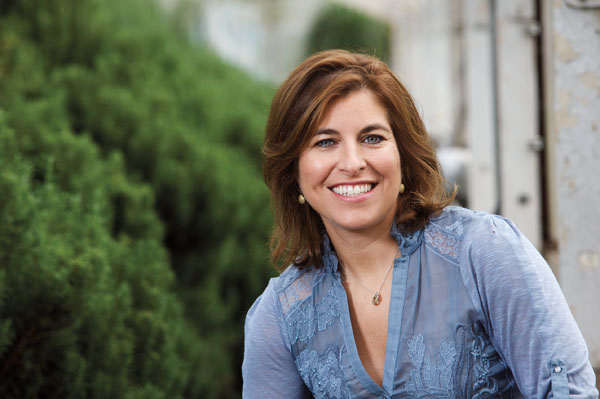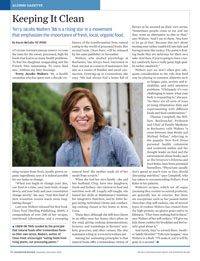Alumni Gazette
 CHEW ON THIS: Guided by the principle that natural foods offer tremendous flavor on their own terms, Walters, author of Clean Food, encourages “eating foods from living plants, not processing plants.” (Photo: Michelle McLoughlin/AP Images for Rochester Review)
CHEW ON THIS: Guided by the principle that natural foods offer tremendous flavor on their own terms, Walters, author of Clean Food, encourages “eating foods from living plants, not processing plants.” (Photo: Michelle McLoughlin/AP Images for Rochester Review)It’s every dieter’s dream: simply to lose the taste for the sweet, processed, high-fat foods that lead to so many health problems. To find the doughnut unappealing and the French fries nauseating. To crave field mix—without any fatty dressings.
Terry Jacobs Walters ’88, a health counselor who has spent over a decade creating recipes from fresh, locally grown organic ingredients, says it is indeed possible for our tastes to change.
“When you begin to change your diet, one food at a time, your taste buds change slowly, and your body and your constitution change slowly,” she says. “And that kind of slow transition creates much more long-lasting change.”
Last year, Walters released her first book, Clean Food (Sterling Publishing, 2009), a compendium of over 200 of her recipes, nutritional information, and a sweeping history of the transformation from natural eating to the world of processed foods. Her second book, Clean Start, will be released by the same publisher in November.
Walters, who studied psychology at Rochester, has always been interested in food, not just as a source of sustenance, but also as a means of familial and social connection. Growing up in Connecticut, she says, “We had always had a home full of natural food. My mother made all of her meals from scratch.”
When she had her own family—she and her husband, Chip, have two daughters, Sarah and Sydney—her interest in food and nutrition took off. Largely self-taught, she honed her skills at Manhattan’s Institute for Integrative Nutrition, and by 2000, began seeing individual clients and conducting cooking classes at her home in Avon, Conn.
These days, although she still sees clients in an office near her home, she’s often on the road, giving cooking demonstrations, lectures, and workshops at farmers’ markets, groceries, and other venues.
Among her animating principles is that natural foods offer a tremendous variety of flavors to be savored on their own terms. “Sometimes people come to me and say they want an alternative to this or that,” says Walters. “And I say to them, ‘You have to let go of that.’ Because this isn’t about turning your turkey sandwich into kale and having it taste like turkey. The point is finding foods that are delicious for their own sake. And then, if you’re going to have a turkey sandwich, have a really good, high quality turkey sandwich.”
Walters says we don’t often give adequate consideration to the role that food may be playing in common ailments such as fatigue, pain, anxiety and irritability, and mild attention problems. “Ultimately it’s very challenging to know what your body is responding to,” she says. “So there are all sorts of ways of doing elimination diets and experimenting with different foods and food combinations.”
Thomas Campbell, the William Rocktaschel Professor and Chair of Family Medicine at Rochester, calls Walters “a cross between Jane Brody and Michael Pollan,” referring to the popular New York Times personal health columnist and cookbook author and the thought leader on food and the environment whose books, such as The Omnivore’s Dilemma and Food Rules, have been perennial bestsellers. “Physicians usually don’t spend as much time as they should discussing nutrition,” says Campbell, who has taken to recommending Pollan’s Food Rules to his patients.
Walters’s recipes, which are all vegan (meaning they contain no animal products), are generally low in calories. But there are exceptions, such as her peanut butter chocolate chip teff cookies, one of several types of cookies Walters has created from the high-protein, no-gluten grain native to Ethiopia. “They have nothing bad in them,” says Walters of her teff cookies. “I’ll give my kids those cookies for breakfast and feel totally good about it.”
And surely, they’ve earned them. Another family favorite? “Tofu kale lasagna,” says Walters in a flash. “I’ll make it, and it will be gone in a second.”

